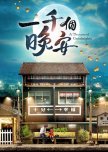Esta resenha pode conter spoilers
"Beauty co-exists with its wounds"
If a person wrote a love letter to Taiwan extolling its people, land, food, and history it might look like A Thousand Goodnights. An adopted daughter sought to finish her father's rail trip of exploration and found an unfinished story needing reconciliation. Later in the drama the journey diverted off the main itinerary into melodramatic territory stranding passengers hoping for more scenic destinations yet still continued the search for meaning between generations and what constituted home.
Kindly Station Master Tai Chia He took an abandoned little girl, Tai Tien Ching, home and raised her as his own along with his daughter, Tai Tien Yu. On the day of his retirement, Cheng No, a young man he had corresponded with through the years returned to Taiwan. Chia He set out the next day on his long awaited rail journey complete with itinerary in hand. When Chia He unexpectedly died Tien Ching and Cheng No decided to finish his trip for him. Along the way they discovered relationships that needed healing-a first love, a birding club, an old friend's birthday party gathering, and a child who needed a family and desired to be a station master.
New friends were made and new family members discovered and romance blossomed along the way. The drama dealt with healing the sins of the past and the problems of the present. It covered a multitude of issues-infidelity, lost parents, dementia, plagiarism, gambling and the trials of becoming an idol. The older generation learned from the younger generation as the younger generation learned from the older generation.
I loved seeing the beauty of Taiwan and learning about some of its history. The rail travels were my favorite part. The healing message and reconciliations were heartwarming if a little too simple. As one character said, "I really miss those days when we traveled together." Me, too, buddy. The story lost some of its magic when it veered off course.
The biggest problem I had was the female lead, Tien Ching. As one character asked her, "Were you born to be exploited?" She was terribly bland and being an artist could not be used as a substitute for actual interesting characteristics. She mumbled quite often and had trouble standing up for herself which led to people taking advantage of her. The actress who played her was limited to pursing her lips and darting her eyes around to convey emotion. Her every movement looked staged and awkward and very rigid in comparison to some of the more natural performances around her.
Overall, A Thousand Goodnights conveyed the value of handing down our stories from generation to generation as well as expanding the friendships to the next generation. Most family and friendship problems were handled respectfully and with compassion. The characters also found the value in home and family and not letting past family heartaches determine how they would treat each other in the present. This charming drama showed not only the beauty of Taiwan and her people, but also how we are all tied to the earth and to each other.
5/31/23
Kindly Station Master Tai Chia He took an abandoned little girl, Tai Tien Ching, home and raised her as his own along with his daughter, Tai Tien Yu. On the day of his retirement, Cheng No, a young man he had corresponded with through the years returned to Taiwan. Chia He set out the next day on his long awaited rail journey complete with itinerary in hand. When Chia He unexpectedly died Tien Ching and Cheng No decided to finish his trip for him. Along the way they discovered relationships that needed healing-a first love, a birding club, an old friend's birthday party gathering, and a child who needed a family and desired to be a station master.
New friends were made and new family members discovered and romance blossomed along the way. The drama dealt with healing the sins of the past and the problems of the present. It covered a multitude of issues-infidelity, lost parents, dementia, plagiarism, gambling and the trials of becoming an idol. The older generation learned from the younger generation as the younger generation learned from the older generation.
I loved seeing the beauty of Taiwan and learning about some of its history. The rail travels were my favorite part. The healing message and reconciliations were heartwarming if a little too simple. As one character said, "I really miss those days when we traveled together." Me, too, buddy. The story lost some of its magic when it veered off course.
The biggest problem I had was the female lead, Tien Ching. As one character asked her, "Were you born to be exploited?" She was terribly bland and being an artist could not be used as a substitute for actual interesting characteristics. She mumbled quite often and had trouble standing up for herself which led to people taking advantage of her. The actress who played her was limited to pursing her lips and darting her eyes around to convey emotion. Her every movement looked staged and awkward and very rigid in comparison to some of the more natural performances around her.
Overall, A Thousand Goodnights conveyed the value of handing down our stories from generation to generation as well as expanding the friendships to the next generation. Most family and friendship problems were handled respectfully and with compassion. The characters also found the value in home and family and not letting past family heartaches determine how they would treat each other in the present. This charming drama showed not only the beauty of Taiwan and her people, but also how we are all tied to the earth and to each other.
5/31/23
Esta resenha foi útil para você?

 54
54 186
186 11
11























